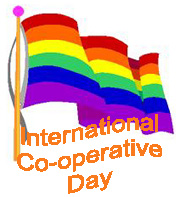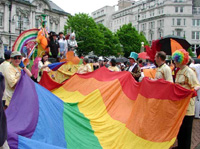July:International Co-operative Day(国际合作节)
(单词翻译:单击)
| International Co-operative Day |
| The first Saturday in July |
 In 1921, at the International Co-operative Congress of World Co-op Leaders wanted to identify and define the growing co-operative movement's common values and ideals to help unite co-ops around the world. They decided1 to hold a special event to celebrate the movement's growing diversity. In 1921, at the International Co-operative Congress of World Co-op Leaders wanted to identify and define the growing co-operative movement's common values and ideals to help unite co-ops around the world. They decided1 to hold a special event to celebrate the movement's growing diversity.
In Essen, Germany in 1922,ICA(国际合作联盟)leaders made plans for the very first international "Co-operators' Day" which was held in July 1923. Since then, on the first Saturday every July, International Co-operative Day has been celebrated2. The day is a chance for co-op members and supporters to work together and promote the co-op movement's successes and ideals of internationalsolidarity(团结), economic efficiency, equality, and world peace. To celebrate theCentennial(百年纪念)of the International Co-operative Alliance, the United Nations declared in 1995 that the first Saturday of July to be celebrated as the United Nations International Day of Co-operatives and requested all member governments to join with their co-operative movements to celebrate the day. Over several years various national movements were trying to register the Rainbow Flag as a trade mark, seeking ICA help in finding out arguments to prove that the flag is adistinctive(与众不同的、有特色的)symbol, reserved to the co-op movement. For us, co-operators it is, but in fact, it has never been registered as the ICA symbol. After the Basel Congress in 1921, which was the first congress to be held after an interruption of eight years caused by the Great World War and facing the new challenges in Europe, the ICA Executive Committee decided to devote some time to Co-operative Propaganda. The membership had grown dramatically, thus, the idea was to find a point ofrally(集合、集会)which would give an identity to movementsscattered(分散)from Japan to Canada.
In these troubled times, the ICA President, G.J.D.C. Goedhart, questioned himself on the causes which hinder the development of the co-op movement. He detected three: lack of information among the general public, lack of knowledge among members and finally lack of ideological4 commitment among managers. "What can be done toremedy(治疗、矫正)these evils? The best means seems to be by general propaganda which must bring to the minds and hearts of outsiders, as in a flash, vivid pictures of the Co-operative Movement, the ideals for which it stands, the real significance of its aims, and how it must necessary give us a much better human society than that in which we live." And already in 1922 the best support for publicity5 appeared to him to be a film. However, since not many societies could have supported such a financial investment, he suggested children's books,lantern slides(幻灯片)and other means of visual propaganda such as exhibitions. "Arrangements should also be made to hold a "Propaganda Day" or "Evening" in every country, town and village on the same day in order to draw the attention of the universe to what we are doing, and also to the whole world" A special "Co-operators' Day" is necessary for this purpose. You are, therefore, called upon to rally to the Standard of "Each for all, all for each" in a great International Demonstration6 on the First Saturday in July next, when the first organized attempt will be made to "broadcast" ourrejoicings(欢庆), our ideals, our successes, and our determination to pursue them to their ultimate goal. |
 收听单词发音
收听单词发音
1
decided

|
|
| adj.决定了的,坚决的;明显的,明确的 | |
参考例句: |
|
|
|
2
celebrated

|
|
| adj.有名的,声誉卓著的 | |
参考例句: |
|
|
|
3
fascist

|
|
| adj.法西斯主义的;法西斯党的;n.法西斯主义者,法西斯分子 | |
参考例句: |
|
|
|
4
ideological

|
|
| a.意识形态的 | |
参考例句: |
|
|
|
5
publicity

|
|
| n.众所周知,闻名;宣传,广告 | |
参考例句: |
|
|
|
6
demonstration

|
|
| n.表明,示范,论证,示威 | |
参考例句: |
|
|
|

 The political map, and most
The political map, and most


